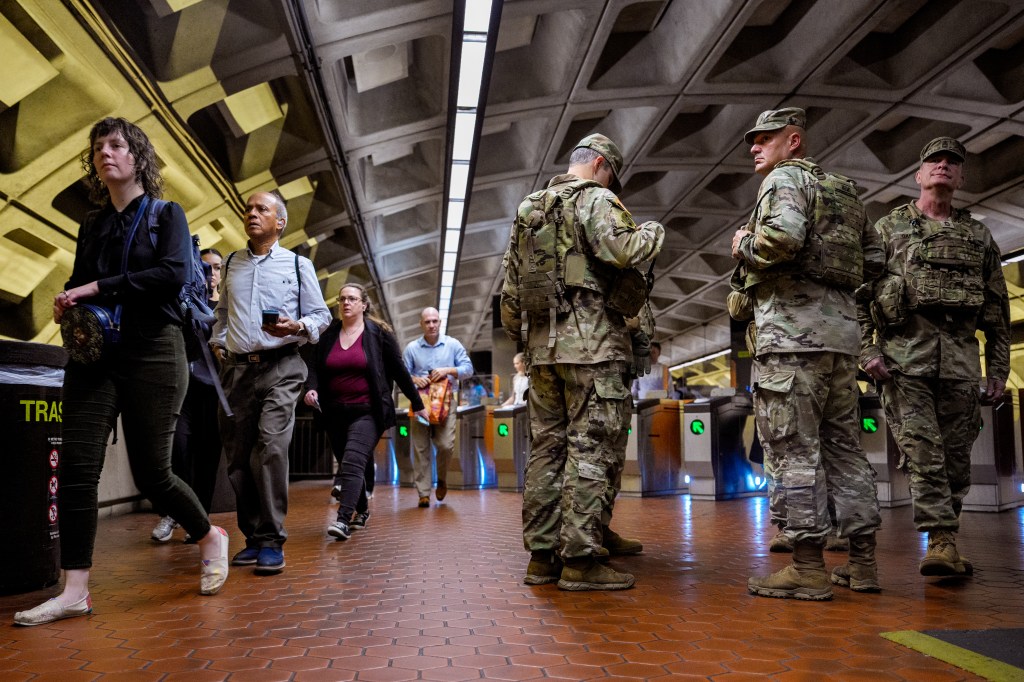Speaking Wednesday to reporters flanked by National Guard troops and Washington, D.C., police that had been commandeered by the Trump administration, Vice President JD Vance, Defense Secretary Pete Hegseth and White House deputy chief of staff Stephen Miller had a clear message for Chicago and other major cities.
Prepare yourselves for the kind of “protection” the nation’s capital has been provided over the past 10 days or so.
On Thursday, Attorney General Pam Bondi disclosed that she gave Gov. JB Pritzker and Mayor Brandon Johnson until Aug. 19 — a deadline that has passed — to revoke so-called sanctuary state and city laws. Bondi told Fox Business that Illinois and other so-called sanctuary states had been told “you better comply or you’re next.”
To which we reiterate, no thank you. We’ve written before in opposition to the prospect of National Guard troops patrolling Chicago streets on the pretext of crime or some other “emergency,” and what we’re seeing in Washington convinces us all the more that we want no part of that.
President Donald Trump last week declared a “crime emergency” in the District of Columbia, which gave his administration power to direct the use of local police resources and to call in the National Guard. A number of Republican governors subsequently have announced they’re sending hundreds of Guard troops under their jurisdiction to D.C.
What residents and workers in Washington have experienced since then is the dystopian presence of uniformed military personnel armed with lethal weaponry patrolling mainly parts of the city that aren’t anyone’s definition of crime-riddled. Georgetown and the heavily touristed National Mall were doing just fine before all this Trumpian nonsense.
Granted, like virtually every American city, Washington has neighborhoods that truly aren’t safe — where street crime and gun violence are unacceptably prevalent. But those neighborhoods aren’t where Trump’s forces are located, which naturally leads to the conclusion that this “crime emergency” is little more than a pretext for Trump to display his vision of a muscular executive branch intervening in the affairs of urban America. Not coincidentally, these are parts of the country that generally didn’t vote for him and continue to oppose his priorities.
In addition to the disturbing images flowing out of Washington, of significant concern is that owners of bars and restaurants in what ordinarily is a thriving and youthfully active city are reporting significant declines in business. Many D.C. residents don’t seem to vibe on going out for a drink or a meal in a city teeming with soldiers and federal agents of various bureaus, some of whom appear to be engaged in aggressive immigration enforcement, despite not working for U.S. Immigration and Customs Enforcement, or ICE. We don’t blame those residents. We’d head outside the District too.
Which brings us to our own city. The last thing needed in Chicago, which isn’t as economically healthy as Washington was prior to Trump’s strongman maneuvers, is discouraging more people from patronizing bars, clubs and restaurants, as well as other attractions.
Downtown Chicago continues to be distressingly light on foot traffic, explained less by worries about crime than the paucity of workers returning to the office compared with other major U.S. cities. Add the militarized scene afflicting D.C. to our current reality and Chicago may well return to the post-apocalyptic feel we saw at the height of the pandemic rather than a city in recovery, albeit not nearly at a pace we’d all prefer.
Another argument against federal intervention: Chicago, arguably unlike some of the other cities on Trump’s naughty list, now has in place a capable and, we hear, cooperative slate of tough-on-crime officials in all of the most important public safety roles. They include Chicago police Superintendent Larry Snelling, Cook County State’s Attorney Eileen O’Neill Burke and, of course, Andrew Boutros, Trump’s own recently confirmed U.S. attorney for the Northern District of Illinois.
While all would agree there remains too much violent crime in Chicago, the latest numbers show that crimes against public safety are being prosecuted far more aggressively and most of what’s now occurring is related to street gangs that have been a scourge in this city for generations. In terms of federal action, a revitalized U.S. attorney’s office — Boutros is actively recruiting dozens of new prosecutors as we write — could and likely will do far more to improve the progress being made here than any destabilizing influx of outside federal forces.
Trump’s attempts to force America’s more reluctant cities into full cooperation with his immigration-enforcement agenda likely plays well with his MAGA base. But polls have shown for weeks that the majority of Americans, while approving of Trump’s securing the southern border, are sour on heavy-handed tactics such as staking out Home Depots and arresting delivery drivers while on the job.
The administration even has managed to lose the support of influential podcaster Joe Rogan, whose endorsement was eagerly sought last year by both Trump and Democrat Kamala Harris. “When people thought about ICE, they thought, ‘Great, you’re going to get rid of the gang members.’ They didn’t think, ‘Great, you’re going to get rid of the landscaper,’” Rogan said on one of his recent podcasts.
Chicago is struggling to govern itself overall, it’s true, and we’ve been consistent critics of many progressive policies that we believe are holding the city back.
But the city is making headway on crime and the key players all have changed for the better. Our federal government is supposed to act as a support for local government.
Submit a letter, of no more than 400 words, to the editor here or email letters@chicagotribune.com.
